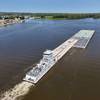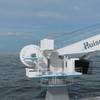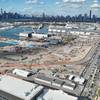Marine Industries are Major Contributor to UK Economy
The UK’s marine industries contribute £3.7 billion to the UK economy each year, according to figures released by the Marine Industries Leadership Council. Comprising well over 5,000 companies, the marine industries employ around 120,000 people across the UK and have a combined turnover of £10 billion. With more than 20 per cent growth in shipbuilding and marine leisure between 2006 and 2008, future growth in the marine industries is expected to amount to billions of pounds for the UK through expanding international markets and marine renewable energy.
Speaking at a parliamentary event to promote the findings of the economic research in his capacity as co-chair of the Council, Minister of State for Business and Enterprise Mark Prisk MP said:
"These figures highlight the importance of the marine industry to the UK economy and to the skills and jobs market. “
“It's an industry worth several billion and the Marine Industries Leadership Council will play a vital role in helping industry to secure more work for the UK.”
Alan Johnston Managing Director of BAE Systems’ Maritime organisation and co-chair of the Council, said: “It is not true that these industries are in decline - nothing could be further from the truth. The high technology marine engineering industry makes a major contribution to the UK economy.
“By working together we have the potential to further increase revenues, boost jobs and our collective value to the economy. Areas of focus include innovation, promoting British expertise in international markets, and skills development. I would encourage companies in the UK marine supply chain to take an active interest in the wider sector and to explore opportunities for collaboration and engagement.”
Case studies demonstrating the breadth of the UK marine industries were presented at the parliamentary event.
Exportability is a key aspect of the Royal Navy’s Type 26 Global Combat Ship design. Potential partners are being engaged in the Assessment phase of the project – with 158 different equipments/tasks resulting in 224 separate engagements with 101 different suppliers from academics to small engineering firms across every major region. Exports of this ship would generate significant income.
Offshore renewables presents the marine industry with an unprecedented growth opportunity. RenewableUK recently showed the sector doubling direct UK employment to over 10,000 between 2007 and 2010. UK companies making the most of this, like Alnmaritec and South Boats, have used their specialist expertise and innovative approach to become major manufacturers of workboats for the offshore wind sector.
UK expertise in Commercial Marine Science and Survey has been exported all over the world. With marine renewable energy we find ourselves once again at the forefront of providing world class marine science and survey capability and are investing in the necessary skills and training to support this expected growth.
The Council aims to maximise the potential of the marine industries and, by June 2011, will develop a UK marine industries growth strategy, building on the UK’s globally-recognised engineering skills and capabilities. The figures announced today will be published as part of this document.
The vision for the UK marine sector is that, by 2020, it will be renowned globally for the quality and value for money of its high technology products, systems and services. The UK is already the fourth largest shipbuilder and one of the largest boat builders in Europe, with a worldwide market and reputation for the quality of its marine equipment. In certain niche markets such as warships and superyachts, the UK has a world-beating position. The UK is also leading the world in developing sustainable offshore wind, wave and tidal energy generation. The aim of the strategy under development by the Council is to ensure that the UK’s share of global market continues to increase across a broad front of marine products and services.
The coming months will see even wider engagement with all the stakeholders in the sector, the emphasis being very much on a business development agenda. The analysis phase has provided a picture of the current landscape and the next phases of the strategy development will set out what, when and how the Council will enhance the future of the industry.













